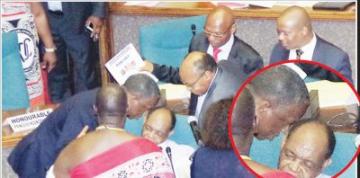E21.6BN BUDGET ROBS THE POOR
 DPM Paul Dlamini and other ministers attending to Minister of Finance Martin Dlamini after he experienced a dizzy spell while presenting his budget speech in Parliament yesterday. (Pic: Sibusiso Zwane)
DPM Paul Dlamini and other ministers attending to Minister of Finance Martin Dlamini after he experienced a dizzy spell while presenting his budget speech in Parliament yesterday. (Pic: Sibusiso Zwane)
MBABANE – Has Finance Minister Martin Dlamini robbed the poor to finance his E21.6 billion 2018/2019 budget?
This question arises from the fact that he has come up with many revenue generating measures without giving back anything to the populace.
When delivering his Budget Speech for the 2018/2019 financial year, the minister explained that revenue was expected to increase by two per cent in 2018/19 to E16.7 billion, which excluded grants.
He attributed the increase to policies expected to be implemented in 2018/19, aimed at reducing reliance on revenue from the Southern African Customs Union (SACU).
The most significant and one that will hit hard on many consumers is the hike in Value Added Tax (VAT) from 14 to 15 per cent.
The increase is further meant to align Swaziland’s VAT with the new rate announced by the Republic of South Africa and to maintain the ‘Sekulula’ refund arrangement
Government will also review the VAT Act to allow taxation of electricity at the standard rate (15 per cent) in order to encourage domestic electricity generation.
Already, the Swaziland Electricity Company (SEC) is expected to implement a hike of 15 per cent, come April 1, 2018. Electricity has been a zero rated commodity, partly meant to allow the poor to also have access to it.
Other polices that will impact heavily on the poor and consumers alike include the review of user fees and fuel tax.
Last year, government had hinted that it would certainly look into increasing certain user fees as means to maximise its revenue streamlines.
The collection of licence fees from mobile companies, introduction of a levy on bank revenue as well as the amendment of the Income Tax Order are some policies that government will be looking into, to generate domestic revenue.
Another policy that is likely to negatively impact on low income earners is the introduction of an import levy on non-SACU used vehicles.
This means that the grey import vehicles, popularly referred to as ‘Dubais’ may not come cheap anymore as the dealers are likely to pass on the levy to buyers.
Many people, especially middle to low income earners, prefer buying these vehicles as they are within their budget range. While adding this burden to consumers, the minister failed to deliver any ‘good news’ for the poor, save to announce that the elderly who turned 60 last year would now be eligible for grants.




 del.icio.us
del.icio.us Digg
Digg
Comments (0 posted):